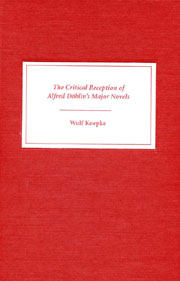Book contents
- Frontmatter
- Contents
- Preface
- Major Novels by Alfred Döblin
- Introduction
- Part One Contemporary Reviews
- Part Two Döblin Scholarship
- 3 Döblin Scholarship: The First Approaches
- 4 Die drei Sprünge des Wang-lun
- 5 Wadzeks Kampf mit der Dampfturbine
- 6 Wallenstein
- 7 Berge Meere und Giganten
- 8 Manas
- 9 Berlin Alexanderplatz
- 10 Babylonische Wandrung
- 11 Pardon wird nicht gegeben
- 12 Amazonas
- 13 November 1918
- 14 Hamlet oder Die lange Nacht nimmt ein Ende
- 15 Döblin's Impact on Other Writers
- Conclusion
- Bibliography
- Index
15 - Döblin's Impact on Other Writers
from Part Two - Döblin Scholarship
Published online by Cambridge University Press: 05 February 2013
- Frontmatter
- Contents
- Preface
- Major Novels by Alfred Döblin
- Introduction
- Part One Contemporary Reviews
- Part Two Döblin Scholarship
- 3 Döblin Scholarship: The First Approaches
- 4 Die drei Sprünge des Wang-lun
- 5 Wadzeks Kampf mit der Dampfturbine
- 6 Wallenstein
- 7 Berge Meere und Giganten
- 8 Manas
- 9 Berlin Alexanderplatz
- 10 Babylonische Wandrung
- 11 Pardon wird nicht gegeben
- 12 Amazonas
- 13 November 1918
- 14 Hamlet oder Die lange Nacht nimmt ein Ende
- 15 Döblin's Impact on Other Writers
- Conclusion
- Bibliography
- Index
Summary
DÖBLIN THE WRITER is known to be avant-garde, unconventional, ever changing, and multi-faceted. How could he possibly serve as a model, as a “master” for younger generations of writers? He did serve this purpose, but relatively little attention has been paid to his impact. Günter Grass did much to change the idea of Döblin as unsuccessful with his 1967 speech, “über meinen Lehrer Döblin.” Yet little has been done since then to follow it up. What Matthias Prangel stated in 1987 — “[Es] ist noch beinahe ungeklärt, welche Bedeutung Döblin seinerseits für Zeitgenossen und Nachgeborene hatte und hat” — has not lost its validity.
Gabriele Sander tracks down some traces of Döblin's influence on other writers in her study “Spurensuche in ‘döblinener Waldung.’ über den Einfluß Döblins auf die Literatur der zwanziger Jahre und der Nachkriegszeit.” Her survey reaches from Lion Feuchtwanger and Bertolt Brecht to Uwe Johnson and Alexander Kluge. She emphasizes the mutual effects between Döblin and Hans Henny Jahnn, whose novel Perrudja, written during the same period as Berlin Alexanderplatz, shows not only the impact of Joyce's Ulysses, but also that of previous novels by Döblin, especially Wang-lun and Berge Meere und Giganten. Among postwar authors influenced by Döblin, Sander singles out Wolfgang Koeppen, for instance Tauben im Gras (136–38), and Arno Schmidt, who expressed his admiration for Döblin's work in many different ways and whose earlier works are clearly marked by his readings of Döblin (138–41).
- Type
- Chapter
- Information
- The Critical Reception of Alfred Döblin's Major Novels , pp. 214 - 217Publisher: Boydell & BrewerPrint publication year: 2003

